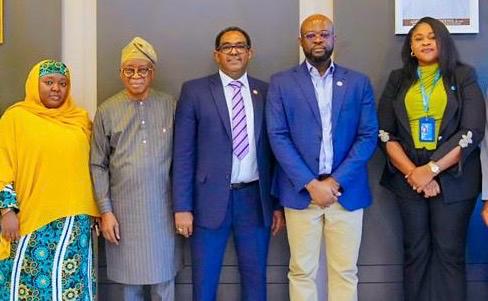
The Food and Agriculture Organization (FAO) of the United Nations has applauded the Minister of Marine and Blue Economy, Dr Adegboyega Oyetola, for his strengthened commitment to increasing Nigeria’s fish production and advancing sustainable development within the nation’s blue economy.
The commendation came from the FAO Representative in Nigeria and to the Economic Community of West African States (ECOWAS), Dr Hussein Gadain, during a visit to the Minister’s office in Abuja last Wednesday.
Dr Gadain praised the Ministry for developing the National Policy on Marine and Blue Economy, describing it as a critical roadmap for the sustainable harnessing of Nigeria’s marine resources. He noted that the UN agency was glad to have contributed to the fisheries and aquaculture chapter of the policy.
According to him, “The policy is comprehensive and positions Nigeria as a pacesetter in the development of the marine and blue economy in Africa. We are pleased to be part of this process, particularly in strengthening the fisheries and aquaculture components that are vital for food security and livelihood creation.”
He added that the FAO would continue to provide technical support and deepen collaboration with the Ministry to increase fish production and strengthen the fish value chain across the country.
Responding, Dr Oyetola expressed appreciation for FAO’s long-standing partnership and reiterated the Ministry’s determination to expand domestic fish production, reduce dependence on importation and stimulate economic growth.
“We value FAO’s consistent technical input and cooperation. Nigeria has the capacity to meet its own fish demand and our goal is to close the production gaps that have forced us to rely on importation for decades,” the Minister said. “By boosting local production, we can conserve foreign exchange, create new jobs and open up opportunities for thousands of young people and investors in line with President Bola Ahmed Tinubu’s Renewed Hope Agenda.”
He emphasised that fisheries and aquaculture remain central to the Ministry’s strategic priorities. “We see Fisheries and Aquaculture as flagship drivers of the blue economy because of their potential to enhance nutrition, stimulate enterprise development and support sustainable livelihoods,” Dr Oyetola stated.
The Minister added that the Ministry was committed to ensuring that Nigeria’s marine and blue economy sector evolves into a major contributor to national development.
“With the right policies, strong partnerships and the renewed focus we are bringing into the sector, Nigeria can become a regional leader in sustainable fisheries production,” he said.